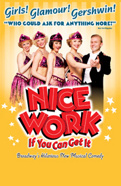Joe DiPietro on His Dream Collaboration With 'the Gershwin Boys' in Nice Work If You Can Get It
About the author:
Joe DiPietro got his start off-Broadway, writing the book and lyrics for the long-running musical comedy I Love You, You’re Perfect, Now Change. After debuting his first Broadway book, All Shook Up, DiPietro earned Tony Awards for Best Book and Best Original Score alongside David Bryan for the hit 2009 musical Memphis. Now DiPietro has teamed up with the Gershwin estate to create Nice Work If You Can Get It, a rip-roaring '20s-era tuner featuring a brand new book and a score packed with Gershwin classics. After opening on Broadway April 24 at the Imperial Theatre, the show was nominated for 10 Tony Awards, including Best Book. Below, DiPietro recalls an exciting (and scary!) phone call from the Gershwin estate, what it’s like to work "alongside" the late George and Ira, and the joy of seeing Nice Work come alive on stage for the first time, thanks to Matthew Broderick, Kelli O’Hara, Estelle Parsons and the rest of the cast.
![]()
Since their deaths, George and Ira Gershwin have been incredibly prolific. I’m lucky enough to be their latest collaborator, and it all started with a phone call out of the blue.
Mike Strunsky, who oversees Ira Gershwin’s estate, called to ask if I’d be interested in taking a shot at a new Gershwin musical. Crazy For You had been a huge hit for them, he said, but it was perceived primarily as a dance show. The Gershwin shows of yore were known as musical comedies, and the Gershwin estate wanted to develop a show that recalled the screwball entertainments of the 1920s—the girls were pretty, the boys were rich, hijinks ensued, and everybody ended up happy.
Being a huge fan of this genre, I immediately agreed and hung up the phone and yelled for joy. Then I panicked. How does one write a modern 1920s musical, insert Gershwin tunes, and make it delightful to today’s audience?
So I took a deep breath and began collaborating with George and Ira. I listened to their recordings over and over again, trying to figure out fresh new ways to present their songs. Fortunately for me, George and Ira turned out to be the perfect collaborators, largely because (A) they were geniuses and (B) they could never disagree with me. So the three of us worked for several months and came up with Nice Work If You Can Get It.
I finished the script and it kicked around a bit (as happens to most new musicals), but then interest seemed to flag (as happens to most new musicals) and I feared our show would disappear into the back of a file cabinet. But one day I received another out-of-the-blue call from an incredibly enthusiastic producer, Scott Landis, who, at the urging of the Gershwin estate, had read my script and was calling to ask if I was interested in having the show produced on Broadway. Of course, asking a playwright if he’d like his show produced on Broadway is like asking a man crawling across a desert if he’d like a Diet Coke. I said, “Hell yes.”
Then two terrific things happened. First, Kathleen Marshall agreed to direct and choreograph. In theatrical terms, that’s called a home run, baby. Second, the script was passed along to Matthew Broderick, who read it, liked it, and wanted to do a reading to see if it played as funny as it seemed. This instilled both great joy and great terror in my heart. Matthew, of course, happens to be a comic genius, so I figured if he couldn’t make my words funny, then my words weren’t funny, and the script would return to musical comedy purgatory. But we did the reading for a select group of incredibly judgmental theater professionals. And they laughed. A lot. Suddenly, the Gershwins were returning to Broadway. And I was going with them.
For our leading lady, we immediately thought of the sublime Kelli O’Hara, who, as it turns out, can pratfall with the best of them. And then one by one, a cast of musical-comedy heavyweights came on board—Michael McGrath, Judy Kaye, Estelle Parsons, Jennifer Laura Thompson—brilliant performers who always know where the funny is.
Rehearsals were a master class of comic shtick. Matthew would try a comic bit, then Michael would try to top it, then Estelle would enter a scene and throw one-liner after one-liner with the dexterity of an all-star pitcher. I’ve never seen people put in so much effort to make it all look so effortless.
The producers booked the Imperial Theatre, and suddenly my collaborators had two shows playing next door to each other—Nice Work If You Can Get It and Porgy and Bess. Not as many people get violently stabbed to death in Nice Work, so our musical is definitely funnier. But if you want to truly experience the range of the Gershwin genius, see both shows. Their musical versatility is breathtaking.
While watching rehearsals from the back of the Imperial, I would often close my eyes and imagine I was in an old black-and-white movie. “Kid,” a fedora-topped producer played by Adolphe Menjou would say to me, “How’d you like to write a big splashy Broadway musical with the Gershwin boys! Big stars! Big sets! Lots of laughs! Gorgeous girls!” I would then open my eyes and it was somehow all there in front of me (except for Adolphe Menjou). And now, Nice Work If You Can Get It performs eight times a week, delivering old-school Broadway thrills for a contemporary audience.
I do wish my collaborators could somehow wander in and see the show. They’d see the most joyous cast on Broadway doing Kathleen’s terrific dances as the audience rocks with laughter. Somewhere, somehow, I hope the Gershwin brothers are happy.
